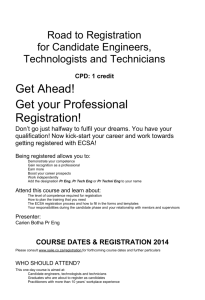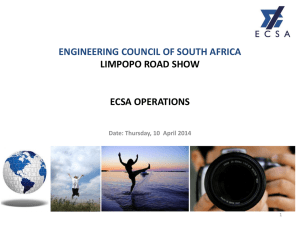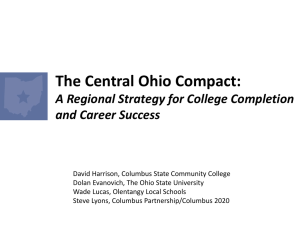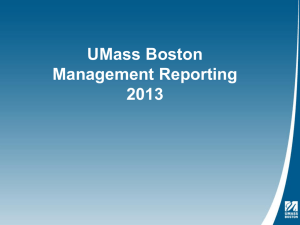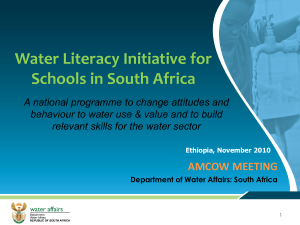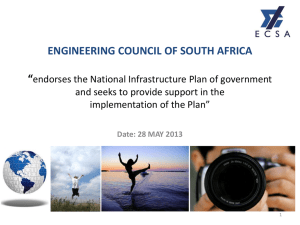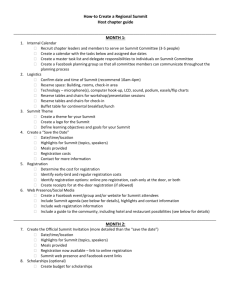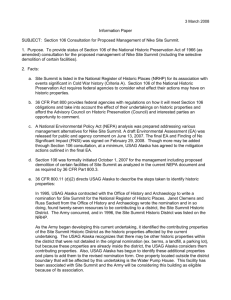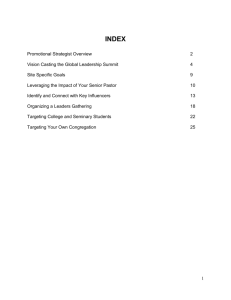Gauteng Roadshow
advertisement
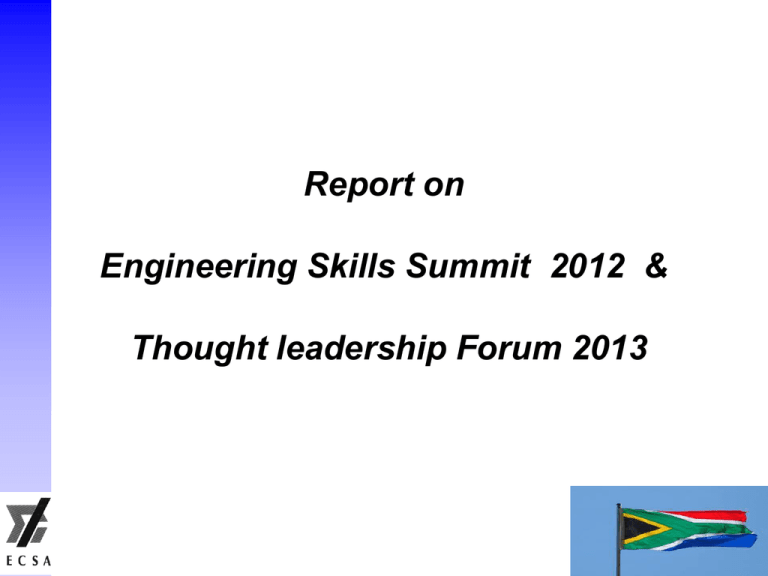
Report on Engineering Skills Summit 2012 & Thought leadership Forum 2013 Outline of Presentation • Overview of the ……….. – 1. Engineering Skills Summit – 2. Thought leadership Forum 2 1. Engineering Education Summit • In 2011 ECSA conducted research into the barriers preventing engineering students from passing on the 4 year BSc Engineering progam. • What motivated the research? An analysis of the 2001 national intake cohort of engineering students at SA HEIs. Graduated within 5 years Still registered after 5 years 4 year Bachelor’s (Eng) 54% 19% National Diploma (Eng) 17% 14% Scott, I., Yeld, N., & Hendry, J. (2007). A case for improving teaching and learning in South African higher education. Pretoria: Council on Higher Education (CHE) and Higher Education Quality Committee (HEQC), http://www.che.ac.za/documents/d000155/index.php. Success rate of students on the 4 year BSc Eng programme African White 4 year Bachelor’s (Eng) 32% 64% National Diploma (Eng) 16% 28% Scott, I., Yeld, N., & Hendry, J. (2007). A case for improving teaching and learning in South African higher education. Pretoria: Council on Higher Education (CHE) and Higher Education Quality Committee (HEQC), http://www.che.ac.za/documents/d000155/index.php. Research identified seven barriers or “levers” to be addressed 1. School system 2. Student selection 3. Engineering Curriculum 4. Teaching and learning 5. Student support 6. Staffing 7. Funding Consultation between DHE&T & ECSA • Research findings presented to the Department of Higher Education & Training (DHET) (Dec 2011) • Two further areas to be addressed were identified 8. Workplace Integrated Learning (WIL) ……… Nat. Diploma 9. Articulation between FET Colleges and Universities Engineering Skills Summit Partnership ECSA worked with the following partners: Department of Higher Education & Training, merSETA, SASEE Purpose of the Engineering Skills Summit 2012 • National debate on barriers to student success • Share ECSA’s 2011 research report: “ Throughput study in the Engineering Bachelors Degree” • Develop Recommendations & Resolutions to present to the Minister of Higher Education • Impact Policy & Practice i.r.o. Engineering Education 9 Summit Delegates • A total of 230 delegates attended the Summit on the 16 October in Kempton Park • Conference Delegates included a wide range of stakeholders: – Higher Education Institutions, – Further Education and Training (FET) Colleges, – industry and commerce, – Government department at all three tiers . Summit Themes and Discussion Groups 1. School system & Student Selection Prof Almarie van Heerden 2. Curriculum aspects and interventions Prof Ian Scott 3. Teaching and learning Prof Jenni Case 4. Student support Chantyl Mulder & Dr Dianne Grayson Summit Themes and Discussion Groups 5. Staffing Dr Allyson Lawless 6. Funding Prof Ian Scott 7. WIL Prof Tshilidzi Marwala & Dr Raymond Patel 8. Articulation Dr Keith Jacobs Post Engineering Skills Summit • Detailed report containing recommendations form each of the eight discussion groups • The final Summit Report containing recommendations was presented to the Minister of HE & T in January 2013 • Recommendations aim to influence policy and practice of Engineering education which in turn will lead to increased engineering graduate output Engineering Skills Summit recommendations • 15 recommendations were made and 4 strategic interventions emanated from the recommendations as follows: A national talent Pipeline and student support initiative Flexible curriculum for first degrees and Diplomas in Engineering Improving Teaching and Learning Funding of Engineering Programmes 14 Post Engineering Skills Summit • A joint Engineering Education working Group was constituted by DHE&T in April 2013 between: ECSA DHET Vocational and Continuing Education & Training Skills branches Universities 15 Joint Engineering Education Working Group Mandate • Operationalise recommendations from the Summit • Investigate Programme Accreditation at FETs • Approval of Candidacy phase learning Programme regulations for Professional Recognition. • FET lecturer capacity in Engineering studies 16 2. Thought leadership Forum • Though leadership forum was hosted on the 12 April 2013 flowing from ECSA strategic objective 3: Advance ECSA’s relevance in SA society through promotion of its role, Mobilisation and have influence on matters pertaining to the Engineering Profession • Eight (8) Engineering discipline groupings participated at the Forum: • Agriculture, Chemical, Electrical, Civil, Industrial, Mechanical, Metallurgical and Mining 17 Consolidated Key Issues for further Development/Research 1. Activities and role of the different Engineering disciplines in utilisation of natural resources (Soil and water) and the impact 2. Development of an integrated multi and inter- disciplinary Engineering practices in Agriculture for contextual understanding of food security, bioresources, Rural Development, Conservation and optimal use of natural resources. 18 Consolidated Key Issues for further Development/Research 3. Exploration of design role in Nuclear Engineering in the South African context. 4. Development of systematic approaches in energy efficiency 5. Appropriate energy mix for South Africa 6. A national integrated smart- Grid strategy in electricity provision 19 Consolidated Key Issues for further Development/Research 7. Automated water leaks management system 8. Problems associated with supply chain and procurement 9. Minerals beneficiation strategy for the country 10. Human capital development strategy for Engineering 11. An integrated national bulk transportation strategy 20 Project Rollout Process • Publish the Thought Leadership Report by 28 May 2013 • Invite Working Group Members from VAs by 30 May 2013 • Set up joint working groups per Engineering discipline by 10 June 2013 – VA representatives – ECSA representatives Project Rollout Process • Each working group to develop an implementation plan – Prioritise the issues (S/T; M/T; L/T) • Advocacy agenda • Position papers • Messages and agree communication vehicles – Agree the research program – Identify spokespersons/champions • Working groups to submit the final implementation plans by 31 August 2013 Thank you - Enkosi - Ha khensa - Re a leboga - Ro livhuwa Siyabonga - Siyathokoza - Dankie
